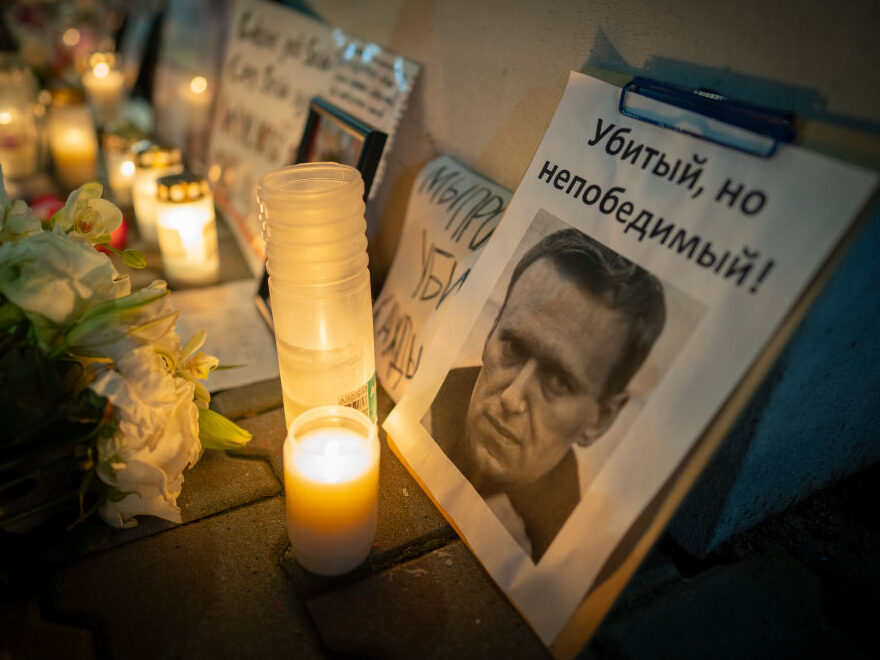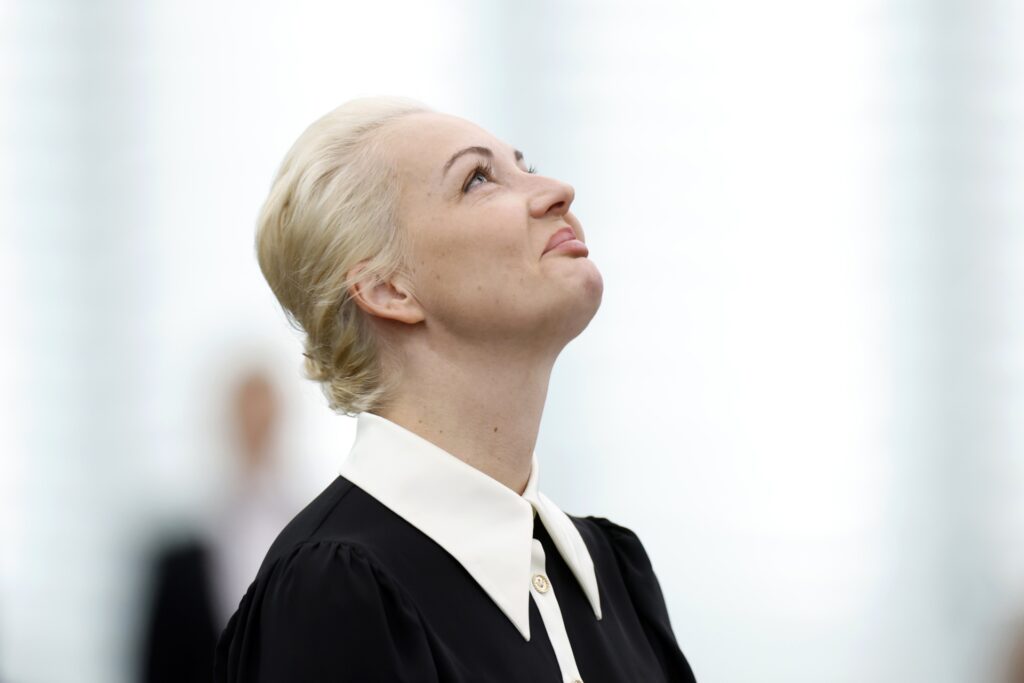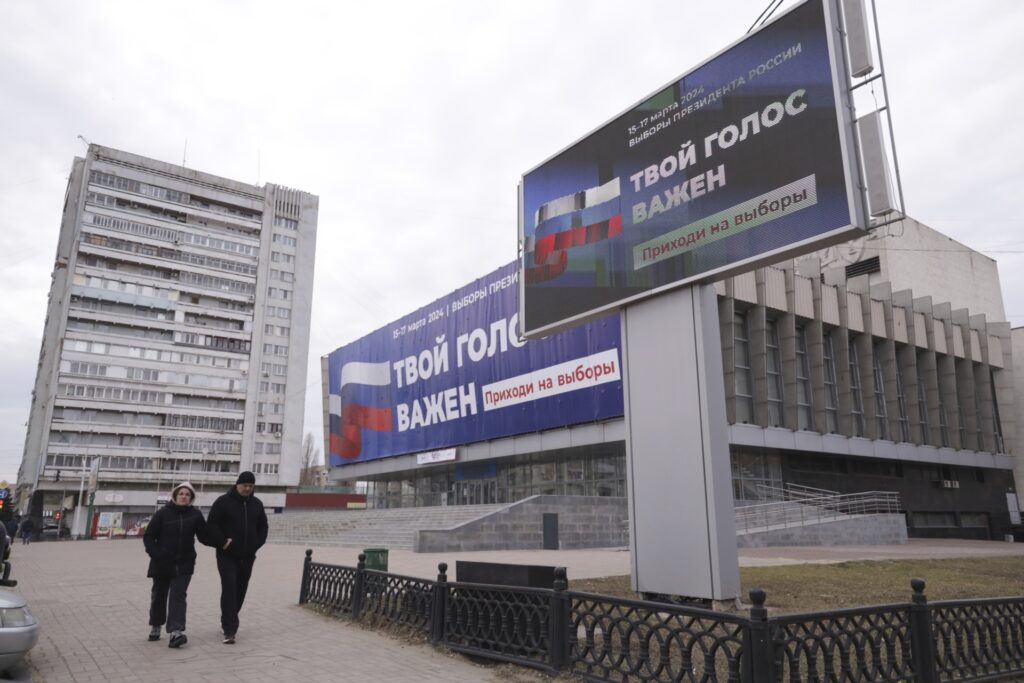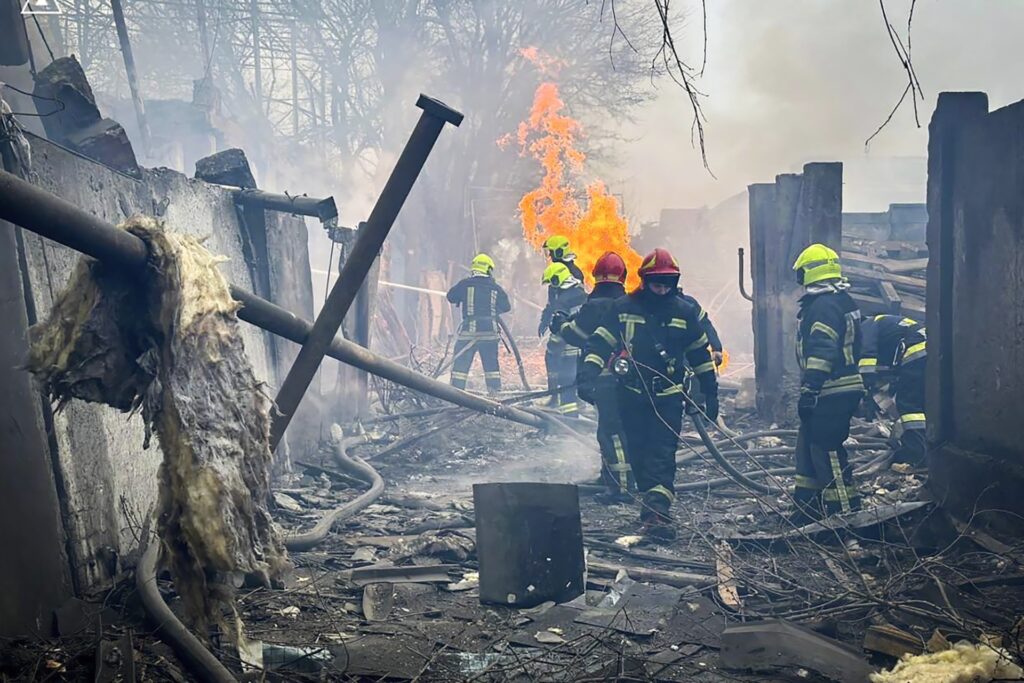

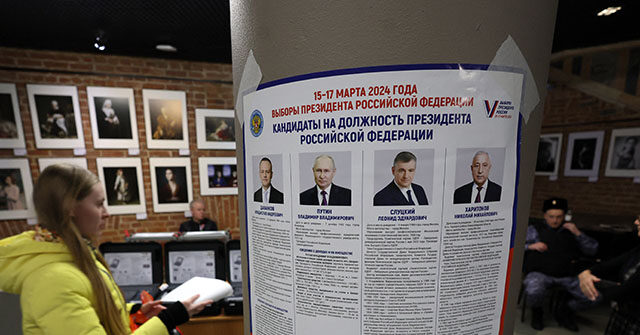
Russia on Friday began a sham three-day election engineered to give President Vladimir Putin another six years in power, with any likely rivals long since intimidated into dropping out, jailed, or killed.
On the latter score, supporters of the late opposition leader Alexei Navalny urged Russians to cast protest votes against Putin as a final tribute to his most persistent political adversary.
Photographs of the late political opposition activist and former presidential candidate Alexei Navalny are seen at a makeshift shrine with candles at the Russian embassy in Warsaw, Poland on February 27, 2024. (Jaap Arriens/NurPhoto via Getty Images)
Navalny supporters dubbed their protest strategy “Noon Against Putin.” Navalny himself endorsed the scheme in one of the last messages he sent to supporters before his mysterious death in an Arctic prison colony last month.
Participants were asked to visit their local polling station at noon, obtain a ballot, and then use it for some gesture of contempt or defiance — from tearing up the paper ballot to writing Navalny in as a candidate.
Actually voting for one of the candidates ostensibly running against Putin was considered the least effective means of registering discontent, since all of them are regarded as “puppets” of the Kremlin, planted in the race just to give Putin the illusion of meaningful opposition.
Navalny’s widow Yulia endorsed the protest and said she was heartened by the level of support her late husband still receives.
“Looking at you, I am convinced that everything is not in vain, and this thought gives me strength. Now you all know that there are actually a lot of us, all those who love and support Alexei, who share his ideas and, as long as we have each other, it’s not over,” she said.
Yulia Navalnaya, widow of Russian opposition leader Alexei Navalny, addresses the European Union’s parliament on February 28, 2024, in Strasbourg, eastern France. (AP Photo/Jean-Francois Badias)
“This is a very simple and safe action, it cannot be prohibited, and it will help millions of people see like-minded people and realize that we are not alone. We are surrounded by people who are also against war, against corruption and against lawlessness,” Yulia Navalnaya said of the election protest.
Navalny previously developed a tactic called “smart voting” that involved taking every opportunity to cast votes against Putin’s United Russia party, to leave him with the smallest possible presence in the legislature. Navalny’s allies compiled lists of opposing candidates and advised supporters on who they could vote for to deliver the maximum possible humiliation to Putin.
This time around, the Putin regime shut down websites run by Navalny’s group and threatened to arrest anyone who engaged in “provocative” behavior during the election. State-run enterprises urged the Putin faithful to vote early on the first day to pump up turnout numbers, while local officials staged amusements to draw people away from the polls during the Noon Against Putin demonstration.
A couple walk past billboards which promote the upcoming presidential election with words in Russian: “Your voice is important” in a street in Luhansk, the capital of Russian-controlled Luhansk region, eastern Ukraine, on Thursday, March 14, 2024. (AP Photo)
Ella Pamfilova, head of the Russian electoral commission, on Friday threatened five-year jail sentences for anyone who vandalized polling stations or interfered with voting. Russian state media reported several such disruptive incidents in Moscow and other areas.
Pamfilova said the harshest punishments would be meted out against “the scumbags who are ready to destroy the votes of people who came and voted because of these silver pieces.” This was an allusion to a rumor pushed in Russian state media that the Ukrainian government paid off election saboteurs.
Two prosecutions were reported on Friday morning, one of them against a woman filmed pouring green liquid into a ballot box, the other against a woman who allegedly threw a firebomb at a polling station in St. Petersburg. Other arson attempts were reported in Moscow and Siberia.
By Friday afternoon, there had been seven reports of voters pouring zelyonka green dye into ballot boxes. The green dye has symbolic significance because opposition leaders were attacked with green dye bombs during the 2010s.
The Moscow Prosecutor’s Office said on Thursday that “unauthorized mass events at polling stations” would be punished. Some Russians who reposted videos and memes calling for demonstrations during the election said they received warnings from the authorities that participating in such events would result in their arrest.
Putin on Friday accused Ukraine of seeking to disrupt the Russian election by launching drones and artillery into Russian territory and massing 2,500 soldiers for a border invasion.
“These enemy strikes will not remain unpunished,” Putin angrily declared during a meeting of his Security Council.
Russian missile strikes on the Ukrainian city of Odesa killed at least 14 people on Friday, including two first responders.
In this photo provided by the Ukrainian Emergency Service, emergency services work at the scene of a Russian attack in Odesa, Ukraine, Friday, March 15, 2024. (Ukrainian Emergency Service via AP Photo)
Stanislav Andreichuk, co-chair of independent vote monitoring group Golos, said on Friday he was observing “the most closed, most secret elections in Russian history.”
Andreichuk noted that intense pressure was brought against employees of state companies to vote for Putin. One such employee told Reuters he and his co-workers were required to submit photographic proof of themselves voting.
“Censorship has been introduced, there’s repression in the country, part of the opposition is behind bars. So these elections are just unfree and undemocratic from the start,” Andreichuk said. His group was barred from observing the election because it was declared a “foreign agent” in 2013 after discovering fraudulent ballots in Putin’s 2012 re-election.
The Moscow Times reported on Friday afternoon that over 400 polling stations in the Russian Far East reported 100 percent voter turnout on the first day of the election. Russia also opened polling stations in the regions of Ukraine it has occupied by force, over the objections of both Ukrainian officials and international observers who said there was absolutely no independent oversight of balloting in those regions.
British-based political expert Konstantin Skorkin derisively referred to the occupied regions of Ukraine as a “field of miracles” because local officials loyal to Putin can “do whatever they want” to produce votes for the Russian dictator.
“There is no doubt that the authorities want to show that Putin wins with great results to demonstrate the unity of the population. I think that the same standards have been established for the heads of these occupation administrations. For the occupied territories, taking part in the election is a loyalty check,” Skorkin said.
The Institute for the Study of War in the U.S. likewise expected Russian-aligned officials to “fabricate a large voter turnout in an attempt to legitimize Russia’s occupation of Ukraine to the international community.”

